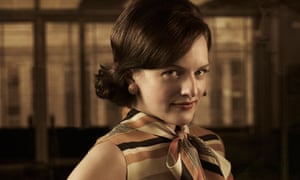Peggy Olson
More than just a survivor
Peggy Olson
More than just a survivor
With the long-awaited fifth season beginning next week, Guardian writers meet the actors who play their favourite characters in the show
Kira Cochrane
Wednesday 21 March 2012 20.00 GMT
With the long-awaited fifth season beginning next week, Guardian writers meet the actors who play their favourite characters in the show
Kira Cochrane
Wednesday 21 March 2012 20.00 GMT
From the moment she read the Mad Men pilot, Elisabeth Moss fell hard for her character, Peggy Olson, attracted by her "delicious complications". Peggy was an ingenue entering a terrifying, towering new world, "and I loved the fact," says Moss, "that she was this really naive, inexperienced, wide-eyed woman – she didn't even know how to use a typewriter – and then, at the end of the pilot, she sleeps with one of her bosses!"
It could have been the start of a tired story – young woman sleeps her way to the top. But Peggy is subtle, confounding, surprisingly strong; someone who uses her ideas rather than her sexuality to get ahead, and exhibits exemplary cool when the two collide. One of her earliest successes came when she was given vibrating exercise pants to test, noticed their surprisingly stimulating effect, and suggested they be sold as a stealthy sex toy, the Rejuvenator. The idea led straight to a promotion.
Peggy is the quiet, mousy Catholic woman who demands her own office. She's the character for whom the word square sometimes seems to have been invented, who declares to her colleagues: "I'm Peggy Olson, and I want to smoke some marijuana." She is the secretary turned stunningly sharp advertising creative who saves the company when it teeters.
And she also often seems the only character set not just to survive the 1960s, but thrive. Some of the other characters, says Moss, "have lived a lot of their lives, and they're not changing their behaviour and habits. But Peggy doesn't know what she will be. She hasn't become the person she is going to be for the rest of her life." (The other notable exception is Sally Draper, who I like to imagine becoming a strident student feminist in the 1970s, fomenting revolution and thus reuniting her parents in a frenzy of shared horror.)
While Peggy's boss Don Draper is on an alarming downward spiral, "she's moving up", says Moss, "and they're passing each other on the way". Their bond is intense, with both nursing dark secrets. Moss's favourite moment came in an episode from the fourth series, called The Suitcase, when Don asked Peggy whether she ever thought about the baby she had after that pilot-episode liaison with colleague Pete. "I try not to," she replied, "but then it comes up out of nowhere." She paused. "Playgrounds." "To me," says Moss, "that one word, 'playgrounds', is my favourite line ever, because it sums up exactly what this person's experience has been with the baby she gave away."
Peggy is a still point amid a welter of trouble, whisky and pills, and one of the joys is in seeing her relationships develop: her often testy interaction with office manager Joan; the uncomfortable frisson between her and Pete – the boss she slept with who is no longer her boss. Peggy is an everywoman, and the epitome of feminism, says Moss, and she is outdoing her colleagues, while remaining essentially good.
Will she take Don's job? Moss laughs. "I have no idea," she says, "but I don't think she wants it. I think she wants her own job, her own life, her own power." If she carries on like this, she'll get it.
Kira Cochrane




No comments:
Post a Comment